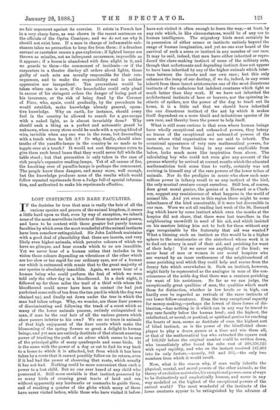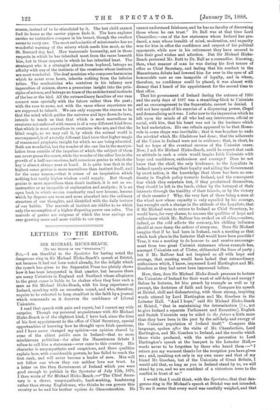LOST INSTINCTS AND RARE FACULTIES.
TF the doctrine be true that man is really the heir of all the various species and genera of the animal kingdom, it seems a little hard upon us that, even by way of exception, we inherit none of the most marvellous instincts of those species and genera, and have to be content with those greater but purely human faculties by which even the most wonderful of the animal instincts have been somehow extinguished. Sir John Lubbock maintains with a good deal of plausibility that there are insects, and very likely even higher animals, which perceive colours of which we have no glimpse, and hear sounds which to us are inaudible. Yet we never hear of a human retina that includes in its vision those colours depending on vibrations of the ether which are too slow or too rapid for our ordinary eyes, nor of a human ear which is entranced with music that to the great majority of our species is absolutely inaudible. Again, we never hear of a human being who could perform the feat of which we were told only the other day in a bloodhound. In a dark night, it followed up for three miles the trail of a thief with whom the bloodhound could never have been in contact (he had just purloined some rolls of tan from the tan-yard in which the dog was chained up), and finally sat down under the tree in which the man had taken refuge. Why, we wonder, are those finer powers -of discriminating and following the track of a scent which so many of the lower animals possess, entirely extinguished in man, if man be the real heir of all the various genera which show powers inferior to his own? We see no trace in animals of that high enjoyment of the finer scents which make the blossoming of the spring flowers so great a delight to human beings, and yet men are entirely destitute of that almost unerring power of tracking the path of an odour which seems to be one of the principal gifts of many quadrupeds and some birds. It is the same with the power of a dog or cat to find its way back to a home to which it is attached, but from which it has been taken by a route that it cannot possibly follow on its return, even if it had had the power of observing that route, which usually it has not had. Nothing could be more convenient than such a power to a lost child. But no one ever heard of any child who possessed it. Still more enviable is that instinct possessed by so many birds of crossing great tracts of land and sea without apparently any landmarks or seamarks to guide them, and of reaching a quarter of the globe which many of them have never visited before, while those who have visited it before
have not visited it often enough to learn the way,—at least, by any rule which, in like circumstances, would be of any use to human intelligence. The migratory birds must certainly be in possession of either senses or instincts entirely beyond the range of human imagination, and yet no one ever heard of the survival of such a sense or instinct in any member of our race. It may be said, indeed, that men have either inherited or repro- duced the slave-making instinct of some of the military ants, though that unfortunate and degrading instinct does not appear to have been inherited by any of the higher animals which inter- vene between the insects and our own race ; but this only enhances the irony of our destiny, if we do, indeed, in any sense inherit from these insect aristocracies one of the most disastrous instincts of the audacious but indolent creatures which fight so much better than they work. If we have not inherited the architectural instincts of bees or beavers, nor the spinning in- stincts of spiders, nor the power of the dog to track out its home, it is a little sad that we should have inherited the one disastrous instinct of the ant by which it makes itself dependent on a more timid and industrious species of its own race, and thereby loses the power to help itself.
What is still more curious is that even where human beings have wholly exceptional and unheard-of powers, they betray no traces of the exceptional and unheard-of powers of the races whose vital organisation we are said to inherit. The occasional appearance of very rare mathematical powers, for instance, so far from being in any sense explicable from below, looks much more like inspiration from above. The calculating boy who could not even give any account of the process whereby he arrived at correct results which the educated mathematician took some time to verify, certainly was not reviving in himself any of the rare powers of the lower tribes of animals. Nor do the prodigies in music who show such mar- vellous power in infancy recall to us any instinct of the bird, the only musical creature except ourselves. Still less, of course, does great moral genius, the genius of a Howard or a Clark- son, suggest any reminiscence of what happens in the world of animal life. And yet even in this region there might be some inheritance of the kind conceivable, if it were but discernible in our race. Were we not all reading last week of the St. Bernard dog which knew by some instinct which even the monks at the hospice did not share, that there were lost travellers in the neighbouring snowdrift in need of his aid, and which insisted on his masters letting him out to look for them without any sign recognisable by the fraternity that aid was wanted ? What a bleseing such an instinct as this would be in a higher sphere to the missionaries or the sisterhood whose work it is to find out misery in need of their aid, and perishing for want of their help ! Yet we never see anything of the kind ; we
never hear of men or women in our moral hospices who are warned by an inner restlessness of the neighbourhood of some perishing soul which they could help and rescue from the dreary fate which overwhelms it. Such an instinct, however, might fairly be represented as the analogue in man of the con- sciousness of the noble dog that there was a creature perishing for want of his assistance. So far as we can judge, the exceptionally great qualities of men, the qualities which mark them for distinction, whether in low levels or in high, can hardly ever be regarded as revivals of the rarer instincts of our lower fellow-creatures. Even the very exceptional capacity for money-making,--perhaps the lowest of these forms of dig.
tinction,—has nothing in it which can in any way be traced to any rare faculty below the human level ; and the highest, the intellectual, or moral, or poetical, or spiritual genius for reaching the hearts of men, seems as destitute of even the highest sort of blind instinct, as is the power of the blindfolded chess-
player to play a dozen games at a time and win them all, or that of the mathematical boy who extracted the square root
of 106,929 before the original number could be written down, who immediately after found the cube root of 268,336,125 with equal rapidity, and who on the instant resolved 247,483 into its only factors,—namely, 941 and 263,—the only two numbers from which it would result.
Now, what is the reason why, if man really inherits the physical, mental, and moral powers of the other animals, as the theory of evolution maintains, his exceptional powers seem always to be distinctively and emphatically human, and never in any way modelled on the highest of the exceptional powers of the animal world ? The most wonderful of the instincts of the lower creatures appear to be extinguished by the advance of
reason, instead of to be stimulated by it. The lost child cannot find its home as the carrier pigeon finds it. The born explorer carries no instinctive compass in his breast, though the swallow seems to carry one. The most enthusiastic of missionaries has no wonderful warning of the misery which needs him most, as the St. Bernard dog had. Man transcends humanity, not in those respects in which he has inherited most from the races beneath him, but in those respects in which he has inherited least. The strategist who is a strategist almost from boyhood, betrays no affinity with any of the instincts of the creatures whose instincts are most wonderful. The deaf musician who composes harmonies which he never even hears, inherits nothing from the inferior tribes. The mechanician who contrives in his infancy new ingennities of science, shows a precocious insight into the prin- ciples of science, and betrays no trace of the architectural instincts of the bee or the bird. All the extraordinary faculties of our race connect man specially with the future rather than the past; with the race to come, not with the races whose experience we are supposed to inherit. We can only suppose the reason to be that the mind which guides the universe and lays down its laws, intends to teach us that that which is most marvellous in creatures not endowed with reason is of a very different kind from that which is most marvellous in creatures who are, and that the blind magic, as we may call it, by which the animal world is encompassed, is of a totally different kind from that higher magic of reason and prophetic insight for which we are being educated. Both are wonderful, but the wonder of the one lies in the manipu- lation from outside of the impulses of which the subject of them can never guess the secret, while the wonder of the other lies in the growth of a half-unconscious, half-conscious genius to which the key is almost always near at hand. It is quite true that in the highest sense genius is more marvellous than instinct itself, and for the same reason,—that it comes of an inspiration which nothing but vastly higher wisdom could supply. But though genius is more marvellous than dumb instinct, it is not as nn- instructive or as incapable of explanation and analysis ; it is an open book in which we can constantly read new lessons, lessons which by degrees are more and more absorbed into the ordinary structure of our thoughts, and identified with the daily texture of our habits. The marvels of instinct are riddles to us which only the assumption of a higher disposing power can solve. The marvels of genius are enigmas of which the true springs are ever growing more and more visible to our eyes.



















































 Previous page
Previous page